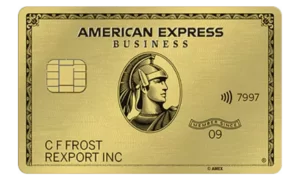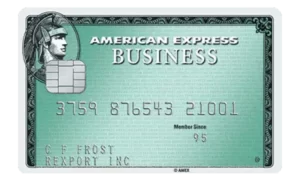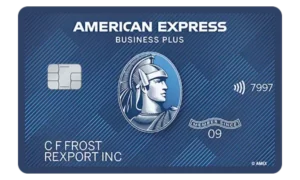Whether your business is a thriving startup or a thriving institution, a business credit card can offer many benefits. Not only does it provide a higher credit limit, but a separate card not tied to a personal account can help organize tax season records. Here are some useful things to consider when choosing the best credit card for your business needs.
Possible benefits of business cards
Business cards are similar to any personal credit card, but with some added benefits and a few caveats. For business accounts, the line of credit tends to be higher. This means you can spend more money on business cards to buy and help grow your business. It also allows companies to build their own credit history, which can be useful for future borrowing or investing in company expansion. Bookkeeping is much easier when your company's finances are separate from your personal accounts.
Higher credit limit
According to 2020 Experian data, the average consumer credit limit is about $31,015, while the average small business credit card limit reaches $56,100. Since card issuers set credit limits based on a variety of factors, including your credit rating and income, it makes sense for businesses to do the same. The sooner your business starts building its own credit history, the easier it will be to increase spending limits and apply for additional lines of credit.
This is especially useful for small businesses with more financial constraints. With a business credit card, it's easier to make bulk purchases, such as bulk inventory and supplies, shipping or travel expenses. Higher spending limits also allow you to make more purchases in a single billing cycle without running out of cards. This avoids increasing your credit utilization – the ratio of your credit card balance to your allocated spending limit.
In short, the lower your balance per billing cycle, the better your business will look. The freedom to make bulk purchases for businesses also gives business owners greater independence from having to constantly seek credit from banks.
Build business credit
Why do companies need their own credit scores? Like individual consumers, a business' financial situation naturally develops a history of spending and income patterns over time.
The benefit of an initial business credit card is the creation and establishment of a business credit score to increase the credibility and reliability of the business in the eyes of other credit card companies, banks and investors. Businesses, like any individual, can benefit from lower interest rates when credit reporting agencies report clean records and stable payment histories.
How to Get a Business Credit Card
Applying for a business credit card is easy, but like any financial decision, it requires careful study. Before completing the online business credit card application, there are a few important points to keep in mind.
SEE ALSO!
- X1 Credit Card – Check how to apply.
- Destiny Credit Card – How to order online.
- Delta Skymiles® Reserve American Express Card Review – See more.
- American Express focuses on customer experience with new checking account and redesigned application
Determine your eligibility
Your business doesn't need to be registered in any way to get a business credit card, and the size of your business has nothing to do with basic credit card eligibility. You can apply for a business credit card even if the expenses you want to pay with your card are part-time jobs, or you are a sole proprietor of small freelancers.
However, whether your business will be approved for a card with many benefits is another question. The first step in applying for a business credit card is to determine which card you are eligible for. If your business has not established credit, your personal credit can make that decision.
The most important factor when applying for a credit card is your or your company's credit history. As a business owner, credit card companies will almost always want to check your personal credit score, so make sure you maintain healthy spending habits on your existing personal accounts. This ultimately determines which cards you are licensed for.
Greater assets and business income can help your business qualify for better cards. If you're just making a few bucks from a part-time job, don't expect to be approved for a high-end business credit card with tons of benefits. You'll need to demonstrate substantial income to get a high credit limit on the best credit cards.
Gather the required information
Business credit card applications will require you to provide proof of business existence in addition to the personal information you typically provide for credit card applications. Details may include your business name, registered address, annual income, number of employees, projected spending needs, and employer ID number (if your business doesn't have an EIN, you can usually substitute your own Social Security number).
Your bank or card issuer will ask you to fill in the above information about the nature of your business and may ask you additional questions during the verification process. Be honest and provide all required documents. Even if your new business's current income is still small or nonexistent, it's a good idea to disclose this and provide a business plan showing expected income.
It may be helpful to look for cards from banks you already have a relationship with – this can make the application process more convenient, efficient and successful.
Entrepreneurs may have problems
Your credit card balance is ultimately your responsibility – as a business owner, you often need to provide a personal guarantee for your business card. If your business doesn't earn enough revenue to cover the full card balance at the end of the pay period, you will be responsible for paying the remainder of your personal balance.
This is another reason why your personal credit history is important when applying for a business credit card – proof that you have a solid payment history and regular income as a retail customer.
As most cards come with a pre-set credit limit, you may find this more difficult if your business has widely varying monthly expenses. When applying for a card, you should carefully consider recurring or initial activation fees, bonuses, incentives, interest rates and, of course, spending limits.
Which card is best for my business?
The right credit card for your business largely depends on how you define your business and how you think the credit card will help you make work-related purchases. Do you travel frequently? Do you often take guests to dinner? Do you buy products in bulk from some companies that can participate in the rewards program?
These are the types of regular purchases to consider. What do you use your credit card for most and what is the average spend? The answers to all these questions will help you find the best business card for your business. Below are some cards that may meet your company's needs.
 [su_label]American Express Business Gold Card[/su_label]
[su_label]American Express Business Gold Card[/su_label]
 [su_label]Ink Business Cash Credit Card[/su_label]
[su_label]Ink Business Cash Credit Card[/su_label]
 [su_label]Marriott Bonvoy Business American Card Express[/su_label]
[su_label]Marriott Bonvoy Business American Card Express[/su_label]
Small Business Credit Cards for New Business
If your business is new, or you've never had a business bank account before, there are certain things you should be aware of so that you can keep spending without leaving behind a potential pile of debt. An example might be a newly purchased card with an introductory APR of 0%. If your business expenses suddenly require a larger amount and you want to pay off more slowly and interest-free during the introductory period, these introductory offers can save you big costs. Please note: Do not buy anything during this period that you cannot pay back, as interest calculated after the introductory period may be retroactive to the date of purchase.
 [su_label]Business Green Rewards Card from American Express[/su_label]
[su_label]Business Green Rewards Card from American Express[/su_label]
 [su_label]The Blue Business Plus Credit Card from American Express[/su_label]
[su_label]The Blue Business Plus Credit Card from American Express[/su_label]
 [su_label]Brex 30 Card[/su_label]
[su_label]Brex 30 Card[/su_label]
Bottom line
While associating a credit card account with your business isn't strictly necessary, the opportunities it can offer you as your business grows are worth exploring. The opportunity to collect rewards and earn cash for future or recurring purchases, as well as the opportunities that a healthy business credit score can unlock, can be essential financial resources for young businesses. Using a separate card for business expenses can also help you better track your personal and professional expenses.
Choose the best card for your business based on your industry and average work-related spending. Before you apply, think carefully about how the card will best serve your business.
SEE ALSO!
- X1 Credit Card – Check how to apply.
- Destiny Credit Card – How to order online.
- Delta Skymiles® Reserve American Express Card Review – See more.
- American Express focuses on customer experience with new checking account and redesigned application


 [su_label]American Express Business Gold Card[/su_label]
[su_label]American Express Business Gold Card[/su_label] [su_label]
[su_label]
 [su_label]Business Green Rewards Card from American Express[/su_label]
[su_label]Business Green Rewards Card from American Express[/su_label] [su_label]The Blue Business Plus Credit Card from American Express[/su_label]
[su_label]The Blue Business Plus Credit Card from American Express[/su_label] [su_label]Brex 30 Card[/su_label]
[su_label]Brex 30 Card[/su_label]